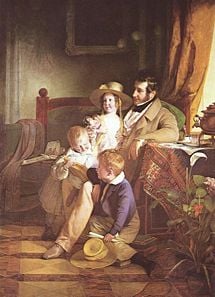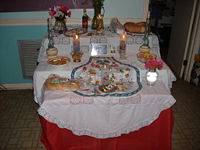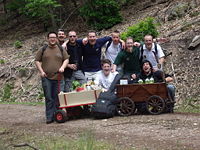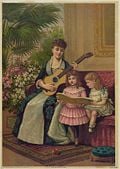Father's Day
| Father's Day | |
|---|---|

| |
| Observed by | Many countries |
| Type | Historical |
| Date | Varies regionally |
| Related to | Mother's Day |
Father's Day is a celebration inaugurated in the early twentieth century to complement Mother's Day. It celebrates fatherhood and male parenting, and honors and commemorate fathers and forefathers. Father's Day is celebrated on a variety of dates worldwide and typically involves gift-giving, special dinners for fathers, and family-oriented activities.
Like Mother's Day, Father's Day was initially celebrated in a religious fashion. In the Catholic tradition, it is connected with the principal feast day of Saint Joseph, spouse of the Virgin Mary, and thus having a paternal role in the earthly family of Jesus. Today, however, it has suffered from commercialization and much of the focus has become external and material. Still, the advertising of consumer items does create awareness of the day, reminding all of the importance of fathers and strengthening the bond between fathers and their children.
Spelling
Although normal English punctuation guidelines indicate that the holiday should be spelled "Fathers' Day" (as it is a plural possessive), common usage dictates that the ostensibly singular possessive "Father's Day" is the preferred spelling.
United States
In the United States, the first modern Father's Day church-service celebration was held on July 5, 1908, in Fairmont, West Virginia, at Williams Memorial Methodist Episcopal Church South, now known as Central United Methodist Church.[1][2] Grace Golden Clayton, inspired to celebrate fathers after the deadly mine explosion in nearby Monongah several months earlier, is believed to have suggested the service to the pastor. The explosion had killed 361 men, many of them fathers and recent immigrants to the United States from Italy. Another possible inspiration for the service was Mother's Day, which had begun to be celebrated in Grafton, West Virginia, a town about 15 miles away.
Another driving force behind the establishment of the integration of Father's Day was Sonora Smart Dodd, born in Creston, Washington. Her father, Civil War veteran William Jackson Smart, reared his six children in Spokane, Washington as a single parent. Dodd was inspired by Anna Jarvis' efforts to establish Mother's Day. Although she initially suggested the date of June 5, her father's birthday, she did not provide the organizers with enough time to make arrangements, and the celebration was deferred to the third Sunday of June. The first June Father's Day was celebrated on June 19, 1910, in Spokane, Washington, at the Spokane YMCA.[3]
Unofficial support from such figures as William Jennings Bryan was immediate and widespread. President Woodrow Wilson was personally feted by his family in 1916. President Calvin Coolidge recommended it as a national holiday in 1924. In 1966, President Lyndon Johnson made Father's Day a holiday to be celebrated on the third Sunday of June. The holiday was officially recognized in 1972, during the presidency of Richard Nixon.
In recent years, retailers have adapted to the holiday by promoting male-oriented gifts such as electronics, tools, as well as greeting cards. Schools and other children's programs commonly have activities to make Father's Day gifts.
By the beginning of the twenty-first century, Americans spent at least several billion dollars on gifts for Father's Day. Per capita spending on Father's Day was $28.97 in 2007, and significantly less than what was spent on Mother's Day, which is more steeped in traditional gifts, some of which tend to be more expensive than Father's Day gifts.[4]
International history and traditions
The officially recognized date of Father's Day varies from country to country, and is celebrated in almost every month of the year. For example, in Bolivia, it is on March 19; Uruguay, on the second Sunday of July; Brazil, on the second Sunday of August; Nepal, on the new moon of September; Luxembourg, on the first Sunday of October; Norway, on the second Sunday of November; and Thailand, on December 5. In South Korea, there is no separate Father's Day, but Parents' Day (어버이 날) is celebrated on May 8. Usually, individuals give a carnation and presents to their parents and may sing the Parents' Day song.
Many countries from all around the world, including Canada and the United Kingdom, celebrate Father's Day on the third Sunday in June, as in the United States. People celebrate the occasion by honoring their father and presenting popular gifts like greeting cards, flowers, candy, and neckties. Father's Day has been greatly commercialized in England with aggressive advertising campaigns to encourage buying gifts and cards. Although there is much criticism of over-commercialization, others suggest that such marketing does have positive impact by creating awareness of the day and thus strengthening the bond between fathers and their children.[5]
In the Roman Catholic tradition, Fathers are celebrated on March 19, Saint Joseph's Day, commonly called the Feast of Saint Joseph, in Western Christianity the principal feast day of Saint Joseph, spouse of the Virgin Mary. In New Orleans, Louisiana, which was a major port of entry for Sicilian immigrants during the late nineteenth century, the Feast of Saint Joseph is a city-wide event. However, in most countries Father's Day is a secular celebration.[6]
Argentina
Father's Day in Argentina is celebrated on the third Sunday of June, but there have been several attempts to change it to August 24 to honor the day when the "Father of the Nation," José de San Martín, became a father.[7] In 1982, the Provincial Governor passed a law declaring Father's Day in Mendoza Province be celebrated on August 24.[8]
In 2004, several proposals to change the national date to August 24 were presented to the Argentinian Camara de Diputados.[8] However, the proposal was never approved by the Senate.[9]
Austria
In Austria Father's Day (Vatertag) was first observed in 1956. Although similar to the American holiday, it is not exactly the same. The date is also in June (on the second Sunday), but the celebration is more religious in character, in the nature of a Catholic feast day.[10] Even more so than in the United States, Father's Day is of much less significance than Mother's Day (Muttertag).
Germany
In Germany, Father's Day (Vatertag), while similar in name has an entirely different origin and meaning from the American tradition.[10] Vatertag is always celebrated on Ascension Day (the Thursday 40 days after Easter), which is a federal holiday. It began as a religious procession, honoring Gott, den Vater (God the Father). It then became a family-oriented day, honoring fathers, but later became a men's day in which celebration involved the consumption of much alcohol.
It became tradition to do a males-only hiking tour with one or more smaller wagons, Bollerwagen, pulled by manpower. In the wagons are wine or beer (according to region) and traditional regional food, Hausmannskost, which could be Saumagen, Liverwurst, Blutwurst (Blood Sausage), vegetables, eggs, and so on. Regionally, the holiday may be called "men's day," Männertag, or "gentlemen's day," Herrentag. Indeed, such celebrations reflect little of the role of men as parents, rather their desire to spend time together with male peers without the responsibility of a family.
Taiwan
In Taiwan, Father's Day is not an official holiday, but is widely observed on August 8, the eighth day of the eighth month of the year. In Mandarin Chinese, the pronunciation of the number 8 is bā. This pronunciation is very similar to the character "爸" "bà," which means "papa" or "father." The Taiwanese, therefore, usually call August 8 by its nickname, "Bābā Day" (爸爸節).
Thailand
In Thailand, Father's Day is set as the birthday of the king. Thus, Father's Day has been celebrated on December 5, the birthday of king Bhumibol Adulyadej (Rama IX). Thai people wear a yellow cloth, which is the king's color. Young male celebrants present the flower of Father's Day, Canna (Dok put ta ruk sa), to their father, grandfather, or parents in the hope that they can become a man.
Notes
- ↑ Kelly Barth, First Father's Day service in 1908, Morgantown Dominion Post, June 21, 1987. Retrieved December 24, 2008.
- ↑ Vicki Smith, The first Father's Day, Martinsburg Journal, June 15, 2003. Retrieved December 24, 2008.
- ↑ The University of Kansas, Father's Day. Retrieved January 8, 2009.
- ↑ IBISWorld, Despite the Economy, Father's Day is Recession Proof, June 9, 2008. Retrieved December 23, 2008.
- ↑ Society for the Confluence of Festivals in India, Father's Day in UK, 2008. Retrieved December 23, 2008.
- ↑ Kerry Tilby, Fathers Day, Kiwi Families, June 2007. Retrieved December 24, 2008.
- ↑ Diariocrítico de México, Argentina, el origen del Día del Padre, ayer Google en español lo tuvo en su Portal, June 16, 2008. Retrieved January 8, 2009.
- ↑ 8.0 8.1 Comisiones de Legislación General y de Familia, Mujer, Miñez y Adolescencia, Orden del día Nº 1798, Sesiones Ordinarias 2004. Retrieved December 23, 2008.
- ↑ Dia del Padre, Homepage. Retrieved January 8, 2009.
- ↑ 10.0 10.1 About.com, Father's Day and Vatertag.
ReferencesISBN links support NWE through referral fees
- Schmidt, Leigh Eric. Consumer Rites: The Buying & Selling of American Holidays. Princeton, NJ: Princeton University Press, 1995. ISBN 978-0691029801.
- Sechrist, Elizabeth Hough. Red Letter Days: A Book of Holiday Customs. Philadelphia, PA: Macrae Smith Co, 1965. OCLC 492111.
- Travers, Len. Encyclopedia of American Holidays and National Days. Westport, CT: Greenwood Press, 2006. ISBN 978-0313331305.
| |||||||
Credits
New World Encyclopedia writers and editors rewrote and completed the Wikipedia article in accordance with New World Encyclopedia standards. This article abides by terms of the Creative Commons CC-by-sa 3.0 License (CC-by-sa), which may be used and disseminated with proper attribution. Credit is due under the terms of this license that can reference both the New World Encyclopedia contributors and the selfless volunteer contributors of the Wikimedia Foundation. To cite this article click here for a list of acceptable citing formats.The history of earlier contributions by wikipedians is accessible to researchers here:
The history of this article since it was imported to New World Encyclopedia:
Note: Some restrictions may apply to use of individual images which are separately licensed.


